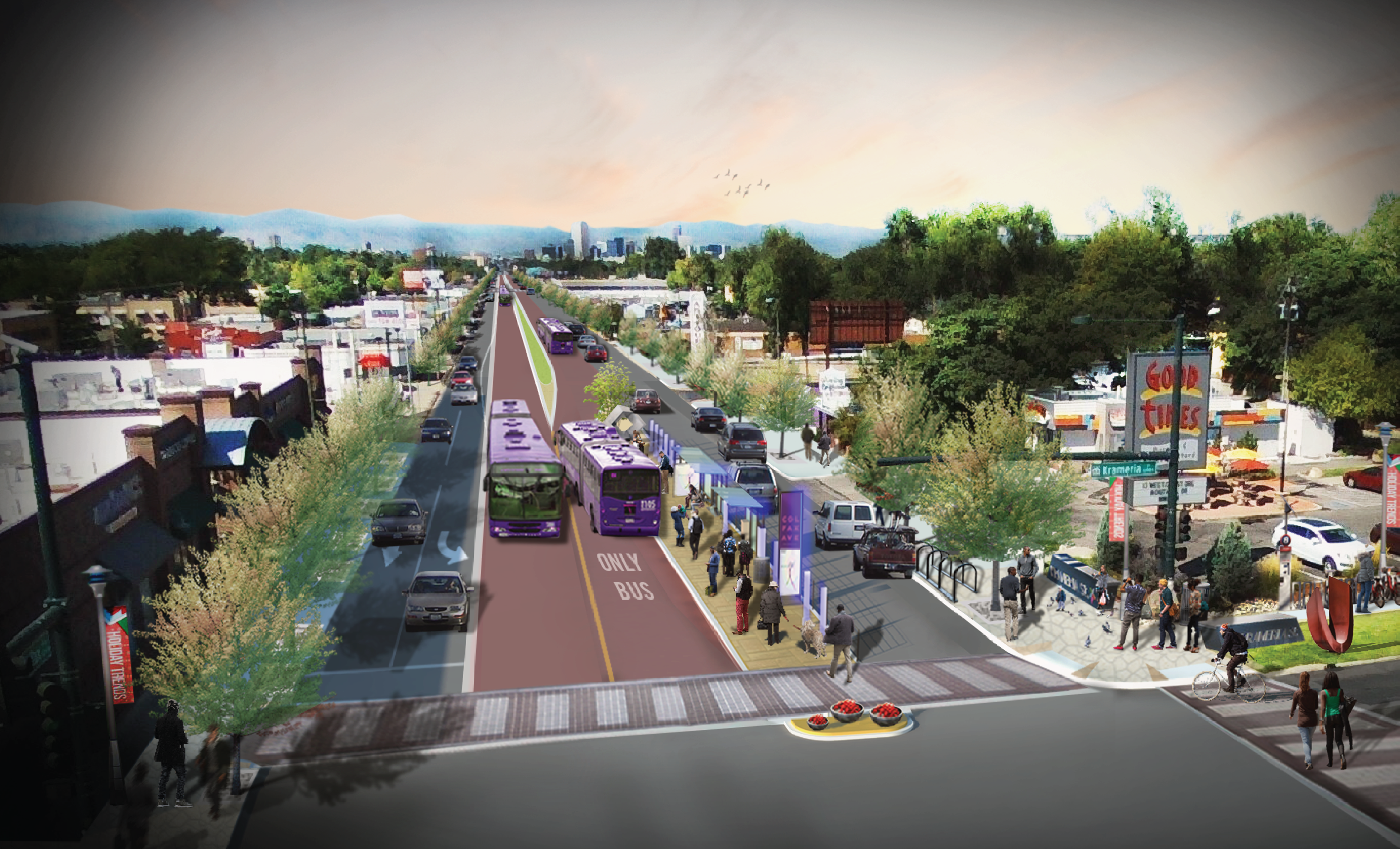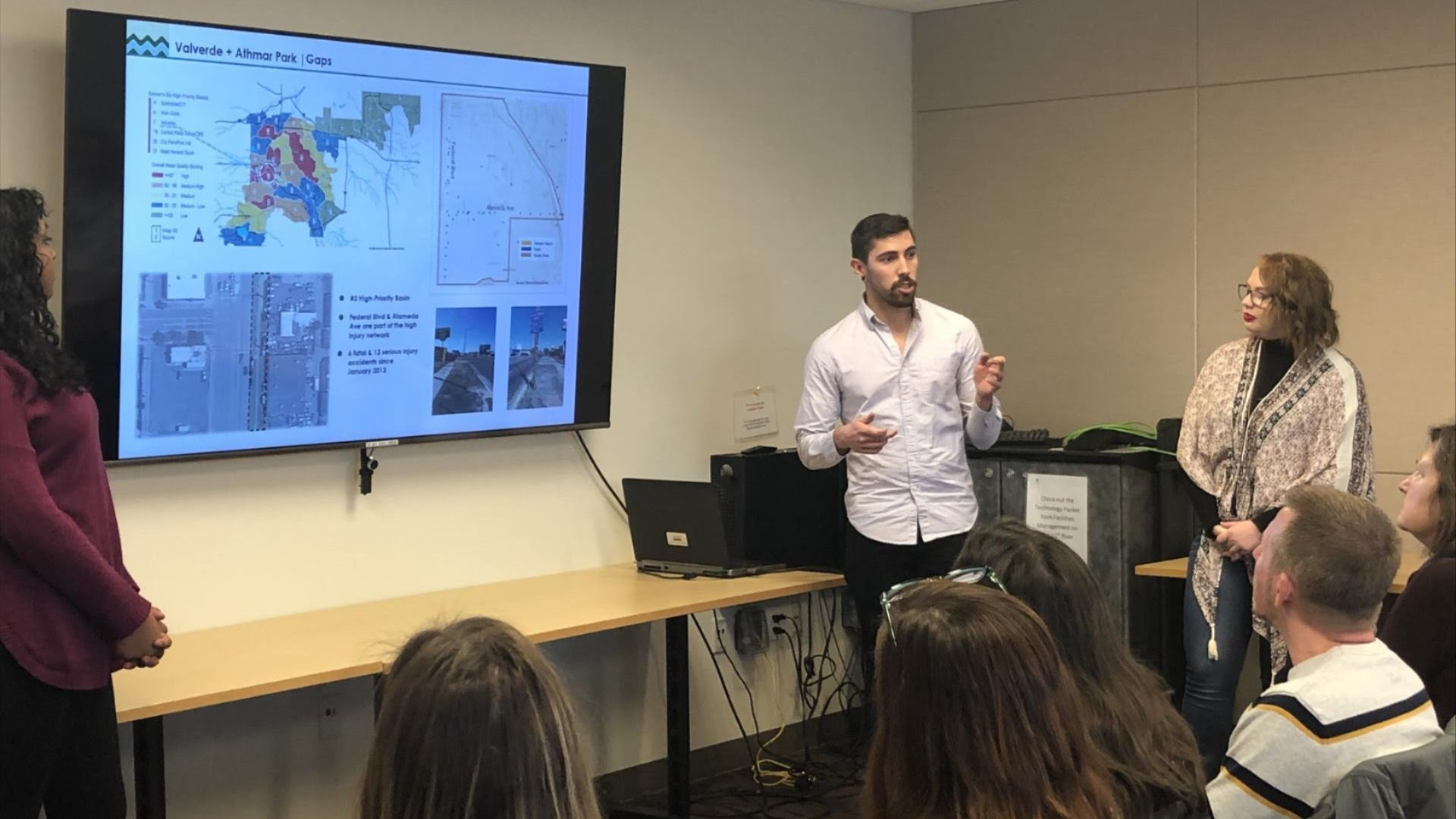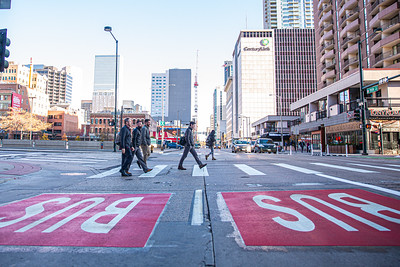Transit
Reliable and affordable transit is a central component of a thriving city.
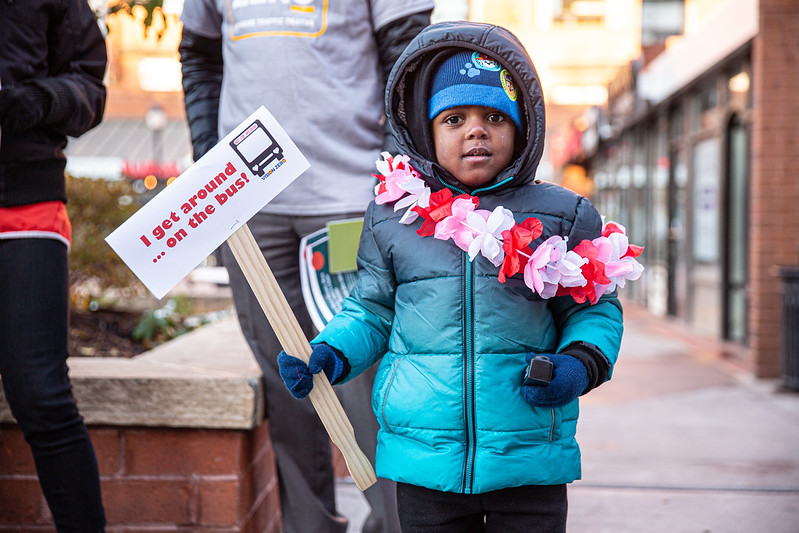
Traffic isn’t inevitable.
Denver is experiencing growing pains. We all know it’s true, often by personal experience. It doesn’t have to be this way.
Other cities chart the course
Seattle’s population increased 23% between 2006 and 2017 while daily traffic volumes declined by 5%. Like Denver, Seattle expanded its rail system during this period. Unlike Denver, Seattle also invested heavily in an extensive bus system and increased households within a 10-minute walk of frequent transit service by 40% in two years.
Quality public transportation makes cities affordable
A better bus system would bring a wide range of benefits to Denver residents. One major benefit is affordability. After housing, transportation is typically the second biggest household expense. The average vehicle costs more than $9,000 per year to own and operate, whereas the most expensive transit pass from RTD costs $2,400 per year, and many discounts are available. Denverites could save a lot of money if public transit made owning a car (or two) unnecessary.
Quality public transportation makes cities healthy
With Denver’s infamous brown cloud making a comeback and climate change an existential threat, it’s more important than ever that we have a reliable public transportation system. Zero-emission vehicles will help but getting more people out of cars is better. The more of us that ride the bus instead of drive, the easier we can all breathe.
Quality public transportation makes cities safe
Traffic fatalities and injuries in Denver have risen to the level of a public health crisis, with 70 people killed on Denver’s streets in 2019. Transit is one of the safest ways to get around and redesigning our streets to prioritize buses will make streets safer for everyone. By moving more people in a smaller amount of space, buses can help transform Denver’s most dangerous streets like Federal Boulevard and Colfax Avenue from car-centric highways to human-scaled main streets.
Here’s how we get there
More than 70% of Denver residents currently live within walking distance of transit, most within 1/4 mile from a bus stop. The reason most of us don’t use buses, however, is because they are not frequent, fast, or reliable. City leaders can significantly improve our existing bus system relatively quickly and inexpensively, as outlined in the new Denver Moves Transit Plan.
Bus-only lanes
Dedicating travel lanes for buses on priority transit streets only requires paint and signage — like the City implemented on Broadway in 2017 and in Downtown in 2019 — to increase the speed and reliability of service. Other simple changes such as traffic signal prioritization and “queue jump” lanes that allow buses to bypass cars at intersections can make taking the bus a fast and reliable option.
Increased Frequency
Denver should pay RTD to run existing buses more frequently on priority transit streets, ideally every 15 minutes or less from 6 a.m. to 10 p.m., seven days a week. Seattle did this, resulting in massive increases in ridership and reversing the death spiral of service cuts leading to ridership losses which lead to more service cuts.
Better Bus Stops
We need to stop treating bus riders like second-class citizens with bus stops hardly more than a stick in the mud beside a busy roadway. People riding the bus deserve a dignified place to wait with comfortable seating, ticket sale kiosks, and shelters that protect from the elements.
Easier Access
Everyone who rides the bus is a pedestrian at some point in their trip. The lack of sidewalks, crosswalks, and bike lanes at bus stops make transit less convenient and less safe. The City should commit to building out a complete network of sidewalks, which are currently missing or substandard on 40% of Denver’s streets.
Investment
Denver needs to find new revenue sources for improved bus facilities, service frequency, and pedestrian and bicycle connections. We have the plans and Denver has an existing bus network that can evolve into a high-functioning transit system. What we need now are City leaders who will implement proven solutions to manage growth and traffic, meaningfully address climate change, reduce traffic fatalities, and create a truly inclusive city by paying for a transportation system that works for everyone.
Transit projects
Stand Up for Better Bus Stops in Denver!
Waiting for Dignity is a a community-driven art project aimed at raising awareness about the poor conditions at many Denver bus stops—and advocating for real change.
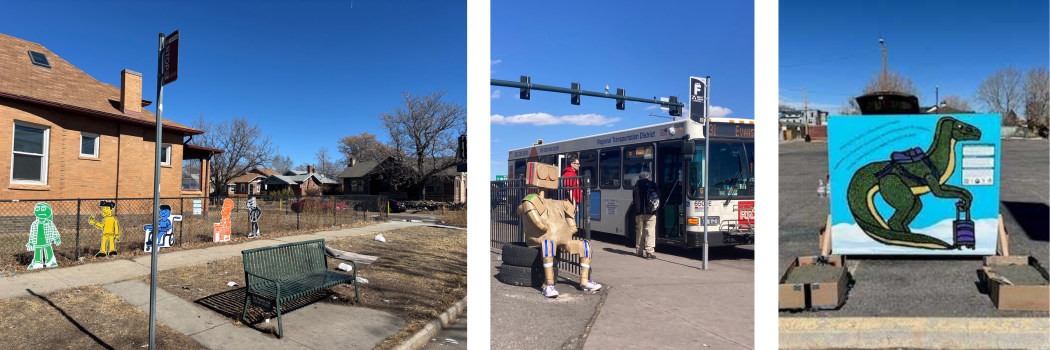
Guiding Principles for Colfax BRT
Bus Rapid Transit (BRT) on East Colfax is projected to bring a dramatic shift in how people move along the corridor. The project is an important opportunity to demonstrate how transformation of major arterials will help achieve Denver’s goals of reducing single-occupant vehicle mode share and eliminating traffic fatalities and serious injuries by 2030. With these goals in mind, we recommend ten guiding principles for implementation of BRT.
Federal Blvd Bus Stop Analysis
Many bus stops in the city lack even the most basic amenities such as seating, protection from the elements, and lighting. We recommend adding these amenities as short-term improvements that would enhance safety, comfort, and convenience for riders along RTD’s second-busiest corridor. On a long-term scale, we recommend much more substantial improvements to Federal’s roadway design and streetscape.
The Pokey Award underscores the need for dedicated bus lanes
We tested different transportation modes in Denver, sending six teams walking, biking, rolling, and riding from one end of downtown to the other during evening rush hour. Each team was assigned a different mode of travel and the champion would be bestowed a Pokey Award. But the goal wasn’t to win, because winning a Pokey Award means arriving last.
Here’s what we’ve been up to:
Transit is the Future: Denver Transit Justice Forum
On December 2, 2020, in partnership with Steering Committee member Mile High Connects, we hosted an exciting panel of transit riders and elected officials to discuss the importance of transit to the Denver metro region. Panelists included representatives from CDOT, RTD, the City and County of Denver, the AQCC, and more.
RTD Bus Rider and Driver Appreciation Event
With the installment of bus-only lanes on 17th street, we decided to celebrate the bus drivers and riders who finally get their own piece of the road. We know our bus drivers work hard to get us where we need to go so we surprised operators with lanyards, coffee gift cards, and good old-fashioned thank you cards as tokens of our appreciation. We also surveyed riders, 83% of whom said their commute was faster as a result of the bus-only lanes.
Related Resources
Agenda for the new Mayor and City Council’s first 100 days in office
The Denver Streets Partnership has released an agenda for Mayor-Elect Johnson and the Denver City Council’s first 100 days in office. The full agenda includes five high-priority actions that can be taken quickly to help address traffic safety, access, and the transportation sector’s impact on climate change and air pollution: Appoint a capable and […]
Special report: RTD can’t seem to overcome its labor shortages — a problem that’s affecting bus and train riders
Shortages of bus drivers, train operators and some other key workers at the Regional Transportation District are just as large or worse than they were before a new union contract last year significantly raised wages, along with hopes for a turnaround.
Here’s why RTD’s light rail system is virtually unusable this week
RTD has suspended train service at this and three other stations until Friday morning as crews replace overhead power lines.
PRESS RELEASE: RTD’s inability to provide shuttles during scheduled service disruptions proves that increased transit workforce recruitment and retention should be an immediate priority for local, regional, and state leaders
PRESS RELEASE — Tuesday, May 23, 2023 MEDIA CONTACT Molly McKinley, Policy Director, the Denver Streets Partnership molly@denverstreetspartnership.org | 919-588-9676 DENVER — Advocates at the Denver Streets Partnership are disappointed that RTD cannot provide bus shuttles this week during scheduled service disruptions due to maintenance on the D, H, and L Lines. “People in […]
Commentary: For Denver’s Next Mayor, a Legacy Project on a Silver Platter
Denver has myriad plans that envision a future where our city has complete, connected transit; sidewalk and bike networks; and development patterns that make it easy and practical for people to choose options other than driving to daily destinations.
RTD weighs cheaper fares and passes, with no regional zones — but airport trips still would cost much more
The Regional Transportation District should lower all fares, nearly eliminate its regional zone map and drastically reduce the cost of monthly passes, according to the latest recommendations from an intensive systemwide study.
Colorado’s ‘Greenhouse Gas Planning Standard’ Changes the Transportation Equation
Across the nation, many state-level elected officials talk about reducing transportation emissions but the agencies they nominally oversee plan and fund automobile infrastructure that increase emissions anyway. Recently, the State of Colorado is instead starting to move toward matching rhetoric with investment.
Denver Connector fills transit gaps in more neighborhoods with “godsend” of on-demand service
Jesse Hill can’t drive because of a sight impairment, so he’s long relied on family members to get around his Montbello neighborhood.
DSP concerned about lack of bus rapid transit connections in Denver Moves Everyone Draft Short-Term Improvements
Dear Director Phipps, On behalf of the Denver Streets Partnership (DSP), we are writing to express our concerns about a major missed opportunity in the Denver Moves Everyone Draft Short-Term Improvements recently released for public comment . . .
RTD faces historic challenges, so why are so few seeking election to its governing board?
When voters in large chunks of metro Denver unfold their ballots, they’ll notice a conspicuous blank — with not even one candidate listed to represent their district on the Regional Transportation District’s Board of Directors.
Yep, RTD’s free fare August led to a ‘fantastic’ ridership increase, data shows
Passengers flocked to the Regional Transportation District’s buses and trains in the highest numbers since the beginning of the pandemic during a free fare program in August.

